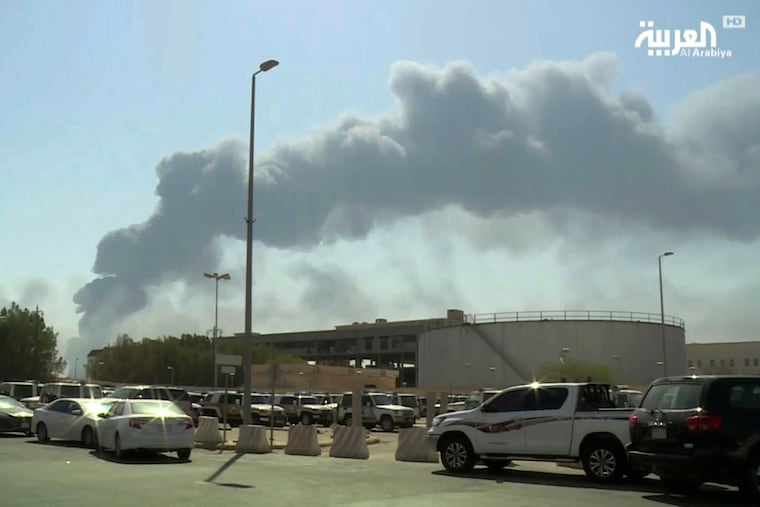Using force against Iran in wake of oil attacks would make Gulf crisis worse | Trudy Rubin
Trump's weak security team and confused Iran policy ensure that a military response to the attack on Saudi oil facilities would boomerang.

Whether you are on the right, left, or center, you should pray that President Trump will avoid embroiling America in a military conflict with Tehran. Even if the cruise missiles that trashed key Saudi oil facilities over the weekend were fired by Iranians.
Not because Iran shouldn’t pay a price for endangering global oil supplies, but because Trump’s Iran policy has blundered so badly you can be certain a military response would make things far worse.
Consider how Trump arrived at the current impasse.
Responsibility for the attack was first claimed by Houthi rebels in neighboring Yemen, who are allied with Tehran. But the plot has thickened, as evidence mounts that the missiles weren’t fired from Yemen, but from Iran.
Trump’s first response to the attack was to tweet “we are locked and loaded.” Since then, despite some bluster, he’s made clear he doesn’t want war. After all, he recently fired the most avid Iran hawk in his entourage, national security adviser John Bolton. And he had recently stated he was ready to negotiate with Iranian President Hassan Rouhani at the U.N. General Assembly session later this month.
Yet, stung by criticism of his tepid response to Iranian attacks on Gulf shipping this summer, the president may be tempted to respond militarily — even though he has promised his base to exit Mideast conflicts.
Given the willful blindness of Trump’s entire Iran policy — and the shocking weakness of his national security team — what could go right?
Start with the policy. One of the early moves of the Trump presidency was to pull out of the accord that had severely curbed Iran’s nuclear program for at least 10 to 15 years. Rather than negotiate a tighter follow-on accord, with support from European and Asian allies, the White House resorted to a campaign of “maximum pressure” — applying sanctions that severely slashed Iran’s oil exports.
But “maximum pressure” only works if you have a realistic goal toward which you are pressing your target. Instead, the White House made clear it expected total surrender from the Iranians.
“Trump only had sticks in his portfolio, no carrots, all or nothing," says former U.S. Ambassador to Yemen Gerald Feierstein, now senior vice president at the Middle East Institute. “There was no indication of what he would exchange for incremental steps by Iran.”
So it’s not surprising that Iran would strike back. The missile attacks could be a possible riposte from Iranian hard-liners who are aware of Trump’s eagerness to exit the region.
I don’t buy the argument that these hard-liners sought to derail Trump efforts to hold a one-on-one with Rouhani at the United Nations. There’s no sign Iran’s Supreme Leader Ali Khamenei would have allowed such a meeting.
But even had the two men met, so what? Trump’s ill-prepared summits have yet to produce any grand bargains. See North Korea, or China.
Moreover, the president has virtually no experienced diplomatic team to back him up.
On Thursday, the president named as his new (and fourth) national security adviser Robert O’Brien, the State Department’s chief hostage negotiator. O’Brien’s main qualification appears to be that he impressed Trump by extricating Americans from Turkey and Yemen. Hardly the chops for the security challenges that face this country. And, by the way, there are still at least five Americans being held in Tehran.
Then there’s Trump’s brand-new U.S. ambassador to the United Nations, a key post for rallying support against the alleged Iranian attack. She is Kelly Craft, the wife of coal magnate Joseph Craft III, a major Trump donor. She reportedly has spent much of her time absent from her current political appointment as ambassador to Canada.
Of course, there is Secretary of State Mike Pompeo, an Iran hawk. He has turned into a presidential yes man, content to let the president operate on his instincts.
Yet those instincts set the stage for this crisis.
To isolate Iran — let alone force Tehran to halt its malignant behavior in the Gulf — Trump would need a top-notch team who could build an international coalition. He would have to convince skeptics, including distrustful allies whom Trump has alienated, that he has a viable plan. He would have to win over Beijing, which is investing heavily in Iran’s oil sector.
And he would have to make compromises with Tehran.
The alternative is military action, which would profoundly roil global oil markets and threaten a global recession. (Despite our increasing energy independence, the United States would still be affected.) “You could get into a tit for tat, and run the risk of a spillover to Iraq, Lebanon, and Israel,” says Feierstein. “If you go down that road, there’s no telling where it stops.”
Of course, the president can punt, taking only symbolic sanctions. In that case, Tehran is bound to test him further.
“Trump has backed himself into a corner,” says Feierstein. “It is hard to get out without being seen as surrendering to Iran.”
But it would be even worse to be backed into a new, wide-ranging, military conflict in the Mideast.